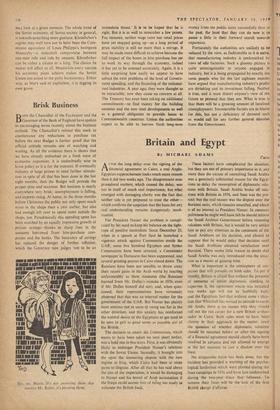Brisk Business
BoTh the Chancellor of the Exchequer and the Governor of the Bank of England have spoken in encouraging terms recently about the business outlook. The Chancellor's refusal this week to countenance any reductions in purchase tax before the next Budget is further proof that the official attitude remains one -of watching and waiting. As all the evidence there is shows that we have already embarked on a fresh wave of economic expansion, it is undoubtedly wise to leave policy as it is for the moment. If eventually industry at large proves to need further stimula- tion in spite of all that has been done in the last eight months, then the Budget will provide the proper time and occasion. But business is nearly everywhere very brisk; unemployment is falling, and exports rising. At home, in the three months before Christmas the public not only spent much more in the shops than a year earlier, but also had enough left over to spend more outside the shops, too. Paradoxically this spending spree has been matched by an equally impressive growth of private savings—thanks to sharp rises in the amounts borrowed from hire-purchase com- panies and the banks. The buoyancy of savings has reduced the danger of further inflation, which the Governor now judges 'not to be an ?V°, Jul, Mavis. It's not annoying them that worries Mr. Butler, it's pleasing them,' immediate threat.' It is to be hoped that he is right. But it is as well to remember a few points. For instance, neither wage rates nor retail prices have yet stopped going up—so a long period of price stability is still no more than a mirage, It may be made more difficult to achieve because the full impact of the boom in hire purchase has yet to work its way through the economy, indeed it has yet to be assessed accurately. Again, it is a little surprising how easily we appear to have solved the twin problems of the level of Govern- ment spending, and the financing of the national- ised industries. A year ago, they were thought to be intractable; now they cause no concern at all. The Treasury has even been taking on additional commitments—to find money for the building societies and the new steel developments as well as a general obligation to provide loans to Commonwealth countries. Unless the authorities expect to be able to borrow fresh long-term money from the public more successfully than in the past, the least that they can do now is to pause a little in their forward march towards expansion.
Fortunately the authorities are unlikely to be seduced by the view, as fashionable as it is naive, that manufacturing industry is pockmarked by rows of idle factories. Such a gloomy picture is quite unrecognisable to anyone engaged in industry, but it is being propagated by exactly the same people who for the last eighteen months have argued that manufacturing industry's profits are shrinking and its investment falling. Neither is true, and it must distort anyone's view of the future to pretend that they are. What is true is that there will be a growing amount of localised unemployment. Innumerable factors are to blame for this, but not a deficiency of demand such as would call for any further general stimulus from the Government.










































 Previous page
Previous page